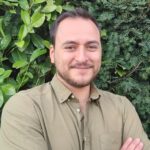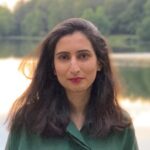Stone Center’s Third Cohort of Postdocs Start Positions at GC Wealth Project and City College
The Stone Center’s third cohort of postdoctoral scholars, Ignacio Flores and Rafia Zafar, started new positions this fall after completing their two-year terms at the Graduate Center. Flores is the new data architecture expert at The GC Wealth Project, and Zafar is an assistant professor of economics in the Division of Interdisciplinary Studies at City College, CUNY.
 As the Wealth Project’s data architect, Flores is responsible for designing and managing the site’s extensive data warehouse. The position involves organizing and integrating a vast array of information on wealth and wealth inequalities, ensuring that the project’s databases are not only comprehensive but also accessible and user-friendly for researchers and policymakers.
As the Wealth Project’s data architect, Flores is responsible for designing and managing the site’s extensive data warehouse. The position involves organizing and integrating a vast array of information on wealth and wealth inequalities, ensuring that the project’s databases are not only comprehensive but also accessible and user-friendly for researchers and policymakers.
His new role expands on the work he completed during his time as a postdoc, when he worked closely with Salvatore Morelli, director of the Wealth Project and a Stone Center Senior Scholar. “I find great satisfaction in shaping the data infrastructure that underpins critical research on wealth disparities,” Flores says. “Working alongside Salvatore enhances this experience, as we share a common vision for the project’s impact.”
The Wealth Project, launched in June, is a central project of the Stone Center. The result of a multi-year effort, the project’s website expands and consolidates access to the most up-to-date research and information on wealth, wealth inequalities, and wealth transfers and related tax policies, across countries and over time.
 At the Stone Center, Zafar focused on intergenerational mobility in developing countries, and on exploring better methodology and econometric techniques to accurately estimate intergenerational mobility. In her tenure-track position at City College, she will continue working on projects that she started at the Stone Center, including one that examines preferences in Pakistan and the U.S. for redistribution to reduce poverty and inequality.
At the Stone Center, Zafar focused on intergenerational mobility in developing countries, and on exploring better methodology and econometric techniques to accurately estimate intergenerational mobility. In her tenure-track position at City College, she will continue working on projects that she started at the Stone Center, including one that examines preferences in Pakistan and the U.S. for redistribution to reduce poverty and inequality.
The Stone Center’s interdisciplinary nature helped her shape that project, Zafar says. “I’m combining sociology and economics in that analysis,” she says. “The project has been influenced by [social psychologist and former postdoc] Bennett Callaghan’s and Leslie McCall’s work — they both reviewed my surveys, and it was extremely helpful. If I’d been in a pure economist environment, I wouldn’t have that kind of feedback.”
She is glad to continue in an interdisciplinary environment in her new department, which includes professors who specialize in political science, sociology, anthropology, and English literature. “They were looking for someone who would not just teach the courses in economics but also bring in the thinking and the skillsets that economists use as researchers,” Zafar says. She is creating a course based on her own intergenerational mobility research. “Most of the students in the department are people of color, and the majority are single parents; they are struggling to make ends meet and need a college degree to get out there and get a job,” she says. “This give me a chance to design a course that is very appealing and very relevant to that cohort of students.”
Both Flores and Zafar said the accessibility of scholars at the Stone Center helped them to broaden their projects and networks. “I instantly felt very comfortable being there, whether talking about work or something else with Janet, with the other postdocs, and with Miles and Branko, whenever I had the chance,” Flores says. “The Stone Center is in fact a multidisciplinary hub, with a lot of people doing very interesting research directly related to inequality but from very different points of view. That opened up a new world.”
Zafar says she valued her frequent conversations with the scholars. “It gives you a lot of confidence as a junior scholar when you meet people like Leslie, Janet, Branko, and Paul, and talk to them about your research and have them read and review your work,” she says. “I really benefitted from those relationships and also from my peers, the postdocs who came before me and the ones who came after. You develop a big network so early on in your career.”
The Stone Center’s fifth cohort of postdoctoral scholars started in September. The sixth cohort will be announced in the early months of next year.
Read More:

